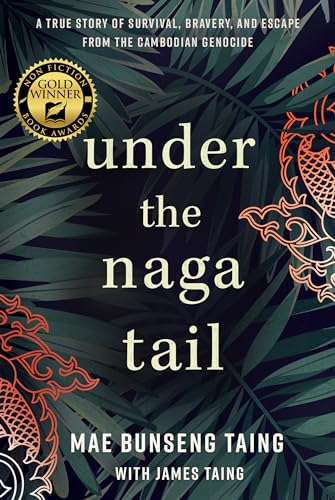Under the Naga Tail: A True Story of Survival, Bravery, and Escape from the Cambodian Genocide by Mae Bunseng Taing
Forced from his home by the Khmer Rouge, teenager Mae Taing struggles to endure years of backbreaking work, constant starvation, and ruthless cruelty from his captors—supposed freedom fighters who turned against their own people. Mae risks torture and death to escape into the dark tropical jungles, trekking across a relentless wilderness crawling with soldiers.
When Mae is able to overcome unthinkable odds in the hopes of reuniting with his family, fate takes cruel turn as he flees war-torn Cambodia. He becomes trapped as a refugee with thousands of others on the ancient temple mountain, Preah Vihear, a place surrounded by countless deadly landmines. Caught up in the terror once more, it is only his willpower to survive and dreams of a better country that give Mae the strength to face the dangers ahead.
This gripping and inspiring memoir, written with Mae’s son, James, is not merely an incredible story of survival, but a testament to the human spirit’s capacity in us all to endure and prevail in spite of great adversity. Under the Naga Tail will find its place among the most epic true stories of personal triumph.
Review: A huge thank you to Goodreads giveaways for a free ebook copy of this memoir.
"Giving up the responsibilty to remember would be to consign the victims to a second death, this time from the collective memory of society. It would be a denial of reality, as if all those inexcusable crimes never happened. As if the element of human nature which allowed them to occur had left us" (7).
Author Mae Bunseng Taing was a teenager and the youngest of eight children raised in Cambodia when the Khmer Rouge took over the country in 1975. What followed was a horrific persecution and extermination of Cambodian citizens. Mae and his family were forced to leave their homes and flee with only what they could carry. He faced starvation, unimaginable cruelty, and a harrowing fight to survive.
Despite obviously surviving this ordeal to write this book, it was truly horrific to read about the great loss of life he witnessed. The never-ending description of the dead or dying throughout this book was hard to read. Mae is constantly stumbling upon bodies in the jungle or suffocating from the stench of decay. Even worse is when they come across the wounded or dying and he is frequently unable to help. I cannot even begin to imagine the mental toil this had on him and other survivors and what a crushing blow to their sense of humanity. Constantly, their dignity was ripped away by their treatment, what they were forced to see and endure, and the humiliating circumstances in which they had to live, which included sitting in their own waste and worse. The pain of watching family members die, have beloved pets removed from their arms, and not knowing the fate of many of those they loved and cared for was difficult to read so I cannot imagine experiencing it firsthand.
Even after the ousting of the Khmer Rouge, when Mae and his family thinks they are saved, they are plunged into a whole new nightmare as he and thousands of other refugees are trapped on an ancient temple mountain of Preah Vihear, which is surrounded by deadly landmines. The army on one side is poised to shoot them, forcing the refugees into the landmine area to use them as human sacrifices to clear the land of mines. "Tigers stalk, poised for a sudden dash to their kill. Crocodiles lie dormant, quitely under the water's edge, waiting for their prey to come to them. We faced two choices. If we went down to the river, we would face the landmines. And if we went to the top of the mountain, we would face the Thai soldiers" (238). I cannot imagine the despair of being plunged into a whole new nightmare but also the feeling of inevitable death ahead.
I'm embarrassed to say I had never read much about the Khmer Rouge genocide before picking up this book, despite the fact that 1.5-2 million Cambodians died as a result of it. I was absolutely floored by his story. I grieved with Mae reading his story. He is so earnest devoted to his family, especially his father, and suffers so greatly at such a young age. This book truly makes you feel grateful for what you have and the sense of gratitude that Mae has for his life in American following his years-long ordeal was moving to see. His gratitude for Americans refugee workers was profound: "That message of upholding human dignity and rights, especially when they are in jeopardy, will always be vital to our world's needs" (331). I also really appreciated all the family photos at the conclusion of the story, which helped give me more understanding of all the members of the family.
At times, I did find it difficult to keep up with some sequences of events. This could be because the author does not speak English as his second language, or it could be the decades that had passed between when the events in this book occurred and when he recorded his memories. Mae also comes from a large family, and I had a hard time keeping up with all of his siblings and extended family, where everyone was, and he was with and why. However, this is no way limited my understanding of Mae's story or appreciation for his story. I give this an enthusiastic five stars and commend Mae and his son for documenting this horrific story so we can all bear witness to the atrocities Mae and his family endured.
Stars: 5



Comments
Post a Comment